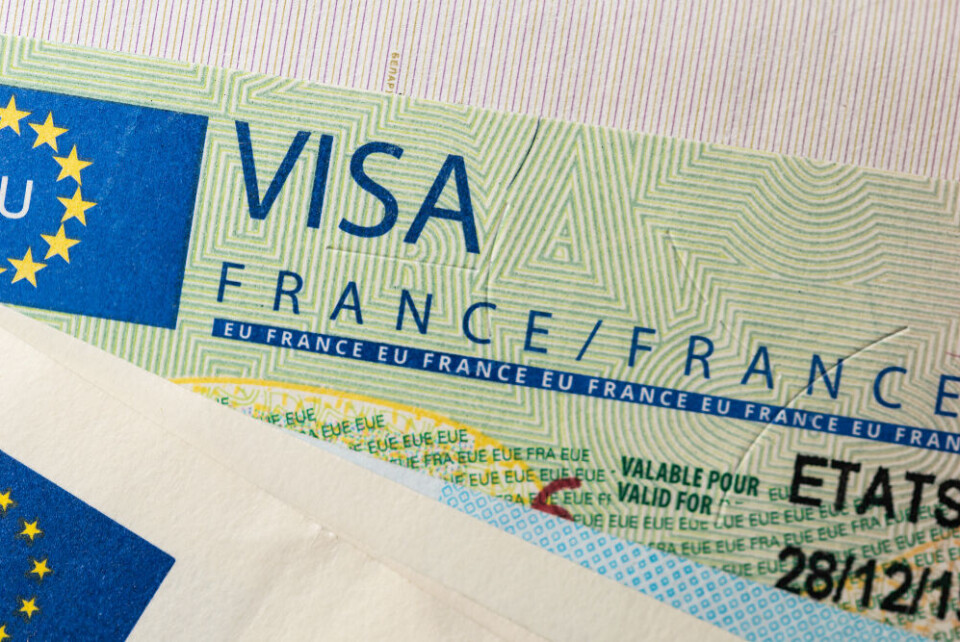-
What you need to know about French civic tests for residency and citizenship
Cultural sessions now offered to newcomers undergoing the Contrat d’intégration républicaine (CIR) process via the Ofii immigration service
-
Is new healthcare fee for Americans still on the way in France?
Last year French MP told how he put forward plan aimed at ‘visitor visa’ holders
-
Pistes closed, confinement orders: Alpine resorts deal with avalanche risk
Increased snowfall this weekend may cause further closures as busy school holiday season continues
Visas for France: how often are they refused and for what reasons?
Nearly 3 million visas were requested in 2023

More than 506,000 visa applications were refused in 2023, according to provisional figures from France’s Interior Ministry.
Just under 3 million visas requested across the year, meaning that a little more than one in six were refused.
The figure includes short-stay visas for those without visa-free access to the Schengen Zone, which accounted for the vast majority of applications.
This includes people from countries including China, India, and those in North Africa, but not, for example, Australians, Britons or Americans, who do not need tourist visas.
The list of countries that currently do not need a visa (but will soon need a visa waiver) can be found below:
Read more: 59 countries affected by new EU visa-free scheme
However one-year long-stay visas and ‘talent passport’ visas are also included in the figures.
Despite an increase in applications compared to 2022 (an extra 700,000), only 6,000 additional visas were refused compared to the year before, when 500,000 were denied.
These figures are considerably below pre-Covid levels, however, where 4.2 million visas were demanded and over 680,000 refused.
There are a number of reasons visas can be refused, ranging from incorrect paperwork to a lack of funds to cover your visit.
What visas are included in the figures?
The Interior Ministry's provisional information for 2023’s visa applications mostly covers visa de court séjour applications.
As a reminder, those from a country which does not have a visa-free access agreement with the EU need to obtain a visa to enter, which is a visa de court séjour.
These visas last for 90 days, and are obtained for people visiting the country mostly for tourist reasons.
Britons, Americans, Australians, Canadians, Japanese, New Zealanders, Brazilians, and many others do not currently need any visa to enter the EU, provided they leave within 90 days and do not break the 90/180 day rules.
This will soon change, thanks to the implementation of the EU’s new border security systems, the Entry/Exit System and Etias.
They will instead have to apply for a visa waiver before their visit.
Read more: What is the EU’s Etias visa waiver scheme?
There were 2,139,937 short-stay visas requested, an increase of 47.2% on the year before, largely spurred by a return to global tourism after the pandemic and in particular from Chinese visitors.
Long-stay visas (visa de long séjour) were broken down into reasons for application, with ‘economical’ reasons (full-time employment, job transfers, seasonal workers) and ‘familial’ ones being the most common.
The number of ‘humanitarian’ long-stay visas (not the same as asylum seekers) saw a 39% drop compared to the previous year, with only 9,579 being approved.
A 20.2% increase in long-stay visitor visas (such as the VLS-TS or visa long séjour valant titre de séjour) was recorded, although there are no national breakdowns for who applied for these specifically.
Overall, 295,447 of these visas were handed out, only a 6.6% increase on the previous year.
Who applied for the most visas?
The Chinese were the highest number of applicants, requesting over 370,00 visas.
This was followed by Moroccan (240,000), Indian (213,000), Algerian (209,000) and Turkish (130,000).
These, alongside the rest of the top 15 – Russian, Saudi Arabian, Tunisian, Lebanese, Filipino, Thai, Egyptian, Ivorian, South African, and Nigerian – made up almost 75% of all visa applications.
Why can visas be rejected?
There is no breakdown for the reason visas were refused precisely, however there are a number of common reasons that visas can be refused.
The most likely of these is issues with supporting documents.
People coming on short-stay visas need to prove they have suitable health insurance for their journey, a place to stay, and proof of travel arrangements to leave the bloc before their visa expires.
They also need to prove they have enough funds to cover their journey – around €65 per day spent in the bloc, and if staying with a host, the host needs to have at least €33 per day.
Another common reason a visa can be denied is if you applied for the wrong one (i.e a tourist visa as opposed to a seasonal worker visa), in which case you will need to reapply.
Any doubt over the validity of your travel documents (passport, ID card etc) will also see your visa refused.
Finally, people who have previously overstayed their visa requirements, particularly for the Schengen bloc, may be refused entry.
The full provisional data from the Interior Ministry can be found here.
Related articles
New expected timeline for EU’s EES and Etias border systems
What changes in France in 2024 for residency rights and border control
























